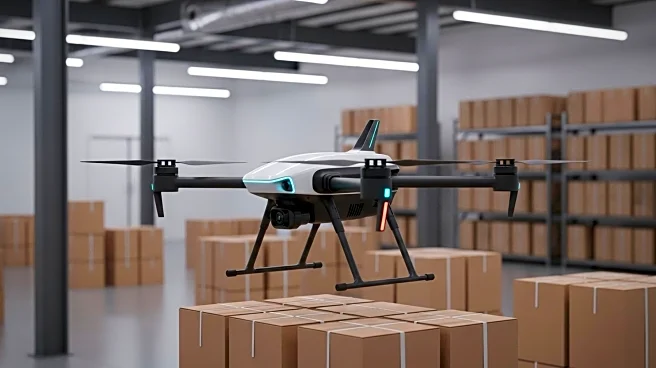What's Happening?
Corvus Robotics has developed an innovative inventory management system using fully autonomous drones to enhance warehouse operations. The Corvus One Autonomous Inventory Management System provides real-time oversight of product locations, significantly improving the speed and accuracy of inventory tracking. This system, developed over four years, allows drones to operate without human intervention, even in complete darkness, using AI-based programming to navigate and record data. The technology is designed to be ten times faster and more cost-effective than traditional methods, offering a digital model of the warehouse environment with each flight.
Why It's Important?
The introduction of autonomous drones in warehouse management represents a significant advancement in logistics and supply chain efficiency. By reducing the need for manual inventory checks, businesses can allocate resources more effectively, potentially lowering operational costs and increasing productivity. The system's ability to provide continuous, accurate inventory data can help companies avoid stock discrepancies and improve order fulfillment rates. This technology could set a new standard in warehouse management, influencing how businesses approach inventory control and potentially leading to widespread adoption across various industries.
What's Next?
As Corvus Robotics continues to refine its technology, the company plans to expand its deployment across more warehouses, potentially transforming inventory management practices on a larger scale. Businesses may begin to integrate these systems into their operations, leading to increased demand for autonomous drone technology. The success of this system could prompt further innovations in the field, encouraging other companies to explore similar solutions. Additionally, the technology's scalability and adaptability to different warehouse environments could make it a versatile tool for various sectors.
Beyond the Headlines
The use of autonomous drones in warehouses raises questions about the future of labor in logistics. While the technology offers efficiency gains, it may also impact jobs traditionally held by human workers. Companies will need to balance technological advancements with workforce considerations, potentially retraining employees for new roles in a more automated environment. Furthermore, the integration of AI and robotics in logistics could lead to broader discussions about data privacy and security, as these systems collect and process large amounts of information.









